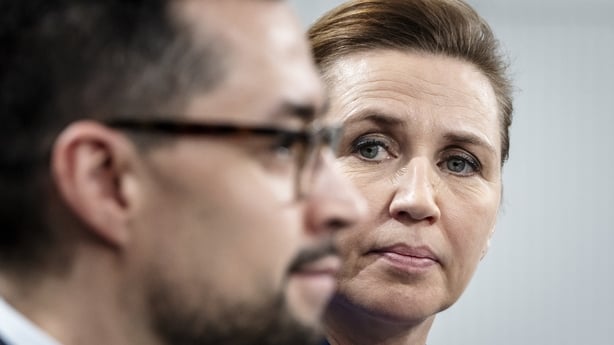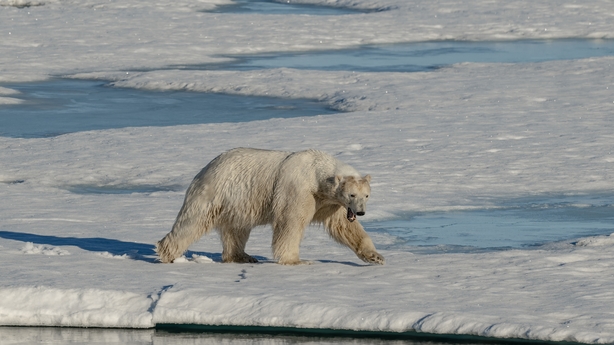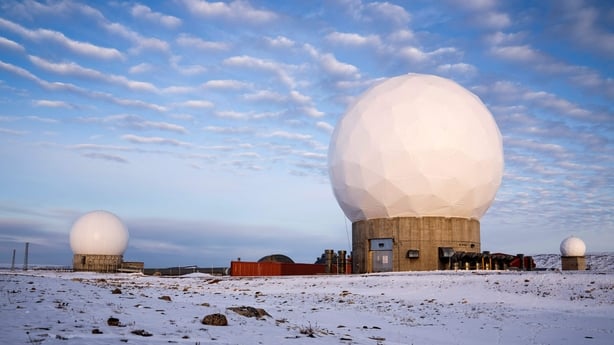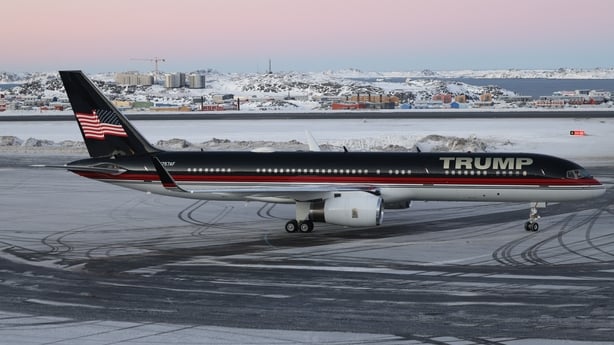This week, the US President-elect mooted an American invasion of a European country.
The self-governing Danish territory of Greenland, he said at a news conference on Tuesday, was essential to America's national security and Denmark, he suggested, would do well to hand it over.
Would he rule out military or economic coercion?
"I can’t assure you on either of those two," Mr Trump said.
He then questioned whether Denmark had any legitimate claim to the world’s largest island anyway, threatening to "tariff Denmark at a very high level" if it was unwilling to bend to his territorial demands.
That fairly blew a chill wind through diplomatic circles where threats to annex someone else’s land are generally – although not always – frowned upon.
"The UN Charter is very clear in the need for every member state to respect the territorial integrity of other states," a spokesperson for the UN Secretary General said when asked about Mr Trump’s comments.
European leaders also pushed back.

"The principle of the inviolability of borders applies to every country - regardless of whether it is east of us or to the west - and every state must respect that, regardless of whether it is a small country or a very powerful state," the German Chancellor Olaf Scholz said.
"Greenland is not for sale," Denmark’s Prime Minister Mette Frederiksen chimed in.
Denmark, notably, is a longstanding US ally and fellow founding member of NATO.
Greenland’s leader Múte Egede, meanwhile, told everyone to mind their own business.
Danes, Americans and everyone else can have their opinions, he said, but at the end of the day "Greenland belongs to the Greenlanders".
Why does Mr Trump want Greenland so much that he’s willing to threaten his country's own allies over it?
In the same news conference, Mr Trump offered something by way of an explanation.
"You don’t even need binoculars," Mr Trump said.
"You look outside, you have China ships all over the place, you have Russian ships all over the place, we’re not letting it happen."
This is the new frontier in great power competition between the United States versus China and Russia, analysts told RTÉ News.
And with its mostly frozen surface and less than 60,000 inhabitants, Greenlands finds itself right at the heart of a 21st century scramble for resources as well as strategic dominance in the northernmost parts of the globe.

"Greenland is a gateway to the Arctic with 38.5 million tons of rare earth oxides, massive uranium deposits, and untapped oil reserves," said Velina Tchakarova of FACE geopolitical risk consultancy, based in Vienna, Austria.
Rare earth elements are essential for things like smartphones, electric vehicles and even weapons.
At the moment, China controls around 90% of the world’s rare earth processing - those are the elements that go into things like smartphones, electric vehicles and even hi-tech weaponry.
Over the past few decades, China invested heavily in the mining and refining of these metals.
Some US, and indeed European, officials worry what an overreliance on China will mean for their tech-dependent economies, especially in the event of a geopolitical shock.
That’s why the largely untapped reserves under Greenland’s ice-sheet are such a draw.
"As global demand for critical minerals grows, Greenland's resources are pivotal to the 4th Industrial Revolution," Ms Tchakarova said.
But mining in Greenland’s remote and hostile conditions is difficult and very costly. And beyond extraction, most companies outside of China still lack the ability to process rare earths at scale.
And it’s not only what’s under the ice that chills Washington.
Some US officials fear growing cooperation between Russia and China in the Arctic is shifting the balance of power in a strategically vital region.
Read more:
Melting ice leads to new cold war in the Arctic Circle
Greenland is not for sale, says its leader in response to Trump
China has sought a foothold in the Arctic for some time, declaring itself a "near-Arctic state" in 2018, despite its location some 1,450 kilometres away.
Russia’s full-scale invasion of Ukraine and ensuing diplomatic isolation gave China its opportunity to move in.
The two countries have since struck deals to develop the Northern Sea Route, a shipping shortcut between Asia and Europe that promises to open up as the Arctic ice thaws.
And last year, for the first time, they conducted joint military patrols there.
"The Arctic has become a vital corridor for the 21st century’s economic and military strategies and the new playground for systemic rivalry between America, on the one hand, and China and Russia, on the other," Ms Tchakarova said.
"Greenland is the crown jewel of the Arctic strategy of the United States," she added.

Greenland no stranger to approaches from US
Of course, this has not come out of the blue.
US officials have long eyed this frozen outpost as crucial to its defence.
And Donald Trump is not the first US President to make serious overtures to Denmark about controlling it.
In 1867, the then President Andrew Johnson considered buying Greenland around the same time as the purchase of Alaska from Russia.
When Denmark was occupied by Nazi Germany, the US moved into Greenland, establishing listening posts.
Then, after World War II, President Harry Truman again floated the idea of buying it outright.
According to documents, classified at the time, the US offered Denmark $100m in gold and access to Alaskan oil if they handed the island over.
There was no sale, but the US and Denmark drew closer, founding NATO in 1949.
At the height of the Cold War, 10,000 US troops were stationed in Greenland, since reduced to around 200.
The Thule Airbase, renamed Pituffic Space Base in honour of the indigenous people who were cleared off the land to build it, is America’s northernmost military base used for ballistic missile detection as well as space surveillance.
But that security relationship has not been without controversy.
In 1968, a US B52 bomber carrying four hydrogen bombs crashed near the US base, spilling radioactive material over the ice for miles and contaminating a fjord.
The Danes were not happy, not least to find out their ally had been secretly storing nuclear weapons on their turf.
They insisted the US clean up the radioactive mess and take it back to America, which they did, apart for a piece of one bomb, which to this day, has never been found.
Their strained relations soon recovered.
"The United States and Denmark have a strong and enduring security partnership, centered on countering Russian aggression and peaceful cooperation in the Arctic region," reads a statement on the US State Department website today.

But it looks like that partnership could be tested once again with Donald Trump in the White House.
It’s a strategy that could backfire, said Marisol Maddox, Senior Arctic Analyst with the Woodrow Wilson Center's Polar Institute in Washington DC.
Weakening America’s long-held security relationships with allies, like Denmark, would only benefit Russia and China, she said.
"The US is strong because of our allies," she said, "that's something that's differentiates us from China".
In the end, the decision will be Greenland’s.
"This is an opportunity for Greenland to make clear it has agency and options," Ms Maddox said.
"And if the US is going to make these kinds of statements which are incredibly aggressive and inappropriate, then that doesn't make the US a super-appealing partner," she said.
"The US should be really thinking about what Greenland is looking for and to realise that there's actually a lot that both countries could gain from having a respectful relationship," she added.







